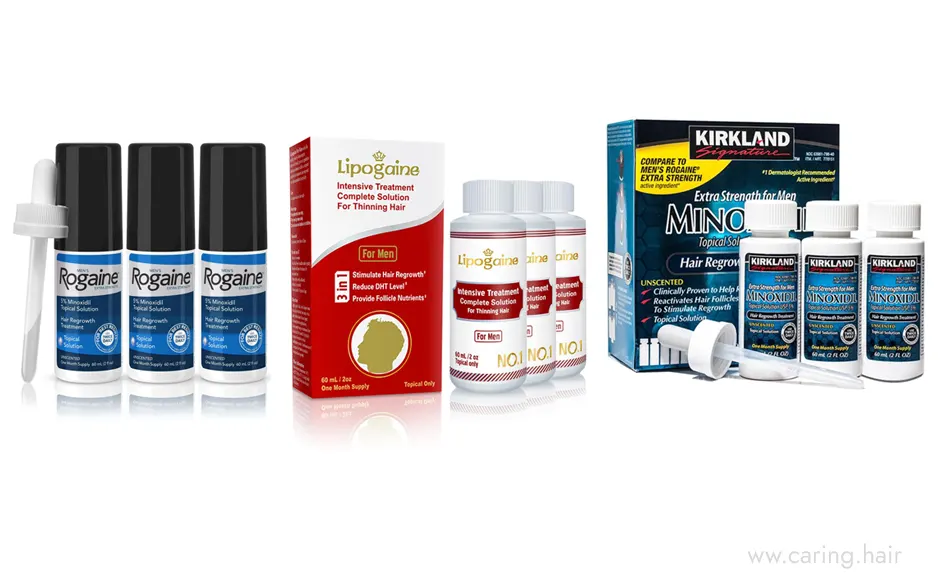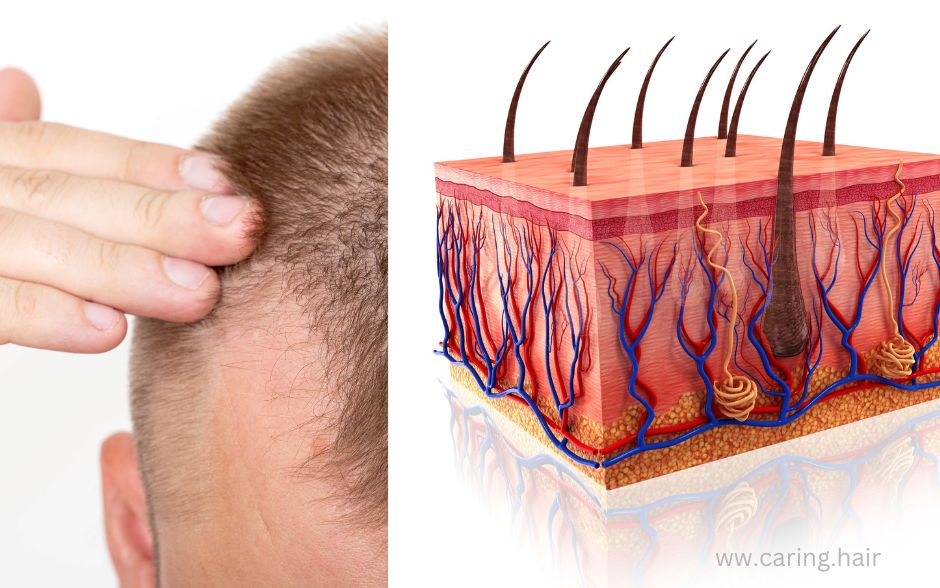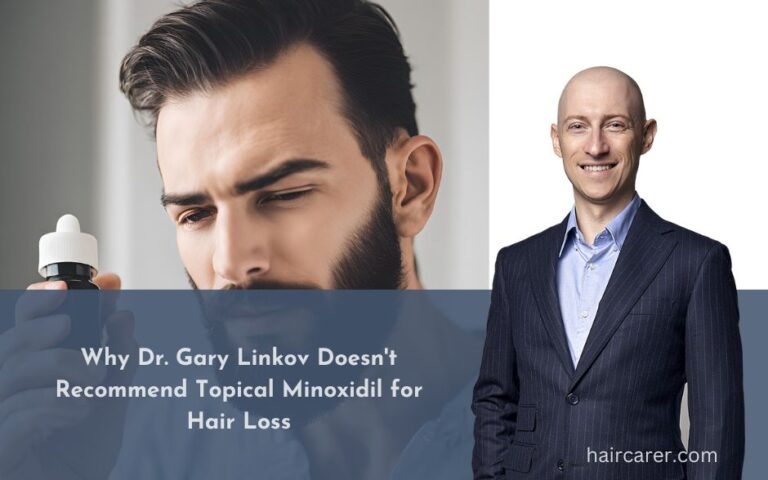While Minoxidil (commonly known as Rogaine) is one of the only FDA-approved treatments for hair loss, Dr. Gary Linkov offers a critical perspective on its use. He often encounters patients seeking solutions for hair thinning or a receding hairline and questions the effectiveness of topical Minoxidil as a primary treatment. In this guide, we delve into Dr. Linkov’s reasons for not recommending topical Minoxidil and explore alternative approaches for managing hair loss.

A Common Clinical Scenario

Consider a typical situation: a 26-year-old man or woman visits Dr. Linkov’s office, concerned about hair thinning or receding hairline. They are diagnosed with androgenetic alopecia, the most common form of hair loss, and are often recommended topical Minoxidil to prevent further loss. Fast forward six months or a year, and the patient continues to lose hair despite using the medication. This raises the question: why is topical Minoxidil not stopping their hair loss?
The Origins of Topical Minoxidil
Topical Minoxidil was FDA-approved in 1988 under the name Rogaine, though its initial submission as “Regaine” was rejected for being potentially misleading. During the clinical trials, patients who used Minoxidil twice daily for four months had varying results. About 8% of users experienced dense hair growth, 31% had moderate growth, and a striking 61% saw little or no change. These statistics reveal that while Minoxidil may benefit some, it is not a one-size-fits-all solution.
The Real Issue: Not Addressing the Root Cause
Dr. Linkov emphasizes that the primary flaw of topical Minoxidil lies in its inability to target the underlying cause of hair loss in most men and women: androgens. Hair loss, especially androgenetic alopecia, is often driven by hormones such as dihydrotestosterone (DHT). In a 1987 study involving hamsters, researchers found that Minoxidil did not act as an anti-androgen. Subsequent human studies confirmed that Minoxidil does not block or reduce the effects of androgens on hair follicles.
Instead, Minoxidil’s main function is to convert fine, vellus hairs into thicker, more robust terminal hairs. It improves the caliber and length of existing hairs but does not increase their number or prevent further loss. As Dr. Linkov describes, Minoxidil “hits the mark but misses the bullseye” when it comes to preventing ongoing hair loss.
Why Patients Continue Losing Hair on Minoxidil
Many people begin using Minoxidil with the hope of halting their hair loss, only to find that the process continues. This occurs because Minoxidil does not have preventive properties against androgen-driven hair follicle miniaturization. Its role is more of a mild stimulant than a solution to the problem. To effectively prevent hair loss, Dr. Linkov recommends anti-androgenic agents like finasteride (for men) or spironolactone (for women). These medications address the hormonal aspect of hair loss, reducing the effects of DHT on hair follicles.

Alternative Hair Stimulation Methods
While Minoxidil stimulates hair growth to some extent, Dr. Linkov suggests other ways to enhance hair health:
- PRP (Platelet-Rich Plasma): A procedure where a patient’s own platelets are injected into the scalp to promote hair growth.
- Low-Level Laser Light Therapy: A non-invasive treatment using laser light to stimulate hair follicles.
- Microneedling: Involves using tiny needles to create micro-injuries on the scalp, boosting hair growth.
- Exosomes: Microvesicles that facilitate cell communication and potentially aid in hair regrowth.
Dr. Linkov mentions that these alternatives can be more effective when used in combination with anti-androgenic therapies.
Minoxidil: A Stimulant, Not a Preventative
Dr. Linkov compares Minoxidil to a cup of coffee: it acts as a stimulant, providing temporary improvement without addressing the underlying issue. To tackle the root cause of hair loss—often related to androgens—he advocates for the use of anti-androgenic medications. These drugs, like finasteride or spironolactone, function as “sleep” for the hair, allowing it to recover and preventing further loss. By blocking the conversion of testosterone to DHT, these treatments reduce the miniaturization of hair follicles and help maintain hair density.
The Limitations of Topical Minoxidil
- Limited Efficacy: Dr. Linkov sees better results in his practice with oral Minoxidil compared to topical forms. While some recent studies suggest a slight improvement in hair density with oral Minoxidil, the differences are often not statistically significant due to the small sample sizes used in research.
- Scalp Irritation: Topical Minoxidil can cause irritation or itching, known as pruritus, due to an ingredient called propylene glycol in the solution. The foam version of Minoxidil eliminates this ingredient, reducing irritation, but can still leave a greasy residue on the hair, necessitating more frequent washing.
- Inconvenient Application: Topical Minoxidil requires twice-daily application, making it harder for patients to adhere to the regimen. In contrast, oral Minoxidil is typically taken once daily, which encourages better compliance.
- Animal Toxicity: Minoxidil is highly toxic to pets, particularly cats and dogs. Exposure can result from licking an owner’s skin, contact with pillowcases, or rummaging through the trash. Symptoms include vomiting, lethargy, breathing difficulties, and low blood pressure. Dr. Linkov points out that oral Minoxidil poses a lower risk of animal exposure compared to topical forms.
The Bottom Line: Rethinking Minoxidil Use
According to Dr. Linkov, Minoxidil—especially in its topical form—is a mild stimulant for hair but not a comprehensive treatment for hair loss. It does not address the root cause, which is hair follicle miniaturization due to androgens. Without incorporating anti-androgenic therapies, individuals using only Minoxidil will eventually continue to lose the battle against hair thinning.
In his practice, Dr. Linkov favors a more holistic approach, combining stimulation methods like PRP or microneedling with anti-androgenic medications to both stimulate and maintain hair health. Patients seeking lasting solutions should consult healthcare professionals to create a personalized treatment plan that addresses their unique hair loss concerns.
